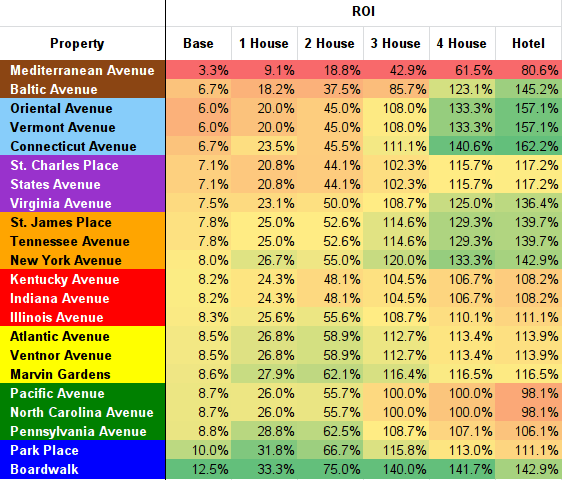Monopoly, the classic property trading game, has been a staple of family game nights for decades. But beneath its simple premise lies a world of strategy, negotiation, and calculated risk. Whether you’re tired of landing in jail while your cousin builds hotels on Boardwalk, or you’re looking to refine your already formidable skills, this comprehensive guide will equip you with the knowledge to consistently come out on top.
Understanding the Board: Property Hotspots
Before diving into strategy, it’s crucial to understand which properties are most frequently landed on. This knowledge forms the foundation of your property acquisition and development strategy.
Top 10 Most Landed On Properties
- Illinois Avenue (Red) – 3.18% chance
- GO – 3.09% chance
- New York Avenue (Orange) – 3.09% chance
- Tennessee Avenue (Orange) – 3.01% chance
- St. James Place (Orange) – 2.92% chance
- Free Parking – 2.88% chance
- Pennsylvania Railroad – 2.75% chance
- Boardwalk (Dark Blue) – 2.63% chance
- Kentucky Avenue (Red) – 2.61% chance
- Indiana Avenue (Red) – 2.59% chance

Notice how the Orange and Red properties dominate this list. Their frequency is largely due to their proximity to the Jail space, a common landing spot throughout the game.
The Orange Crush: Your Path to Victory
The Orange properties (St. James Place, Tennessee Avenue, and New York Avenue) are the Goldilocks of Monopoly – not too expensive, not too cheap, and just right for bankrupting your opponents. Pairing them with the Red properties creates a formidable stretch of the board that your opponents will dread landing on.
Mastering Game Phases
Early Game Strategy: Laying the Foundation
- Aggressive Acquisition: Buy every property you land on. This prevents opponents from getting monopolies and gives you trading leverage.
- Focus on Key Sets: Prioritize Orange, Red, and Light Blue properties due to their high landing frequency and return on investment.
- Railroad Strategy: Aim to acquire at least 3 railroads. They provide consistent income and are valuable trading pieces.
- Trading Tactics:
- Trade aggressively to complete color sets early.
- Offer trades that seem fair but give you a strategic advantage (e.g., 2-for-1 or 3-for-2 trades).
- If you can’t complete a set, try to own at least one property in each set to block others.
- Financial Management:
- Maintain at least $500 in cash for unexpected expenses and opportunities.
- Don’t hesitate to mortgage less strategic properties to buy key properties or build houses.
Midgame Strategy: Building Your Empire
- Property Development:
- Build 3-4 houses on each property in your monopoly before considering hotels.
- The jump from 2 to 3 houses significantly increases rent, often making it the sweet spot for ROI.
- If possible, create a housing shortage by building 4 houses on each property and not upgrading to hotels.
- Jail Strategy:
- Early-Mid Game: Pay to get out of jail immediately to continue acquiring properties and collecting rent.
- Late-Mid Game: Start considering staying in jail if opponents have developed properties.
- Opponent Analysis:
- Keep track of opponents’ cash reserves.
- Anticipate where opponents might land and develop those properties first.
Late Game Strategy: Sealing the Deal
- Property Management:
- Focus on developing properties that opponents are most likely to land on.
- Balance between keeping cash for emergencies and reinvesting in properties.
- Jail Strategy:
- Unless you have a safe path, staying in jail protects you from high rents.
- Use “Get Out of Jail Free” cards strategically, saving them for when you have a favorable board position.
- Endgame Tactics:
- Force Liquidation: If an opponent is low on cash, develop aggressively to force them to sell houses or mortgage properties.
- Strategic Sales: If you’re in trouble, sell houses evenly across properties to maintain rent-earning potential.
Advanced Tactics for Monopoly Masters
Probability Mastery
Understanding dice probabilities can give you a significant edge:
- 7 is the most common roll (17.1% chance)
- 6 and 8 are next (13.9% each)
- Use this knowledge to predict likely landing spots and develop accordingly
Psychological Warfare
- Master the art of persuasion in trades. Create alliances when beneficial, but be prepared to break them.
- Apply pressure on opponents when they’re vulnerable, potentially forcing errors in judgment.
The Housing Market: More than Just Real Estate
Remember, in Monopoly, you’re not just playing the game – you’re playing the system. Here’s how to game the housing market:
- Build, baby, build! Develop your properties faster than your opponents can say “gentrification.”
- Hotel? More like No-tel! Stick to houses – there are only 32 in the game. Hoard them like toilet paper in a pandemic!
- Be the slumlord of Mediterranean Avenue. Even the cheapest properties can be cash cows if you play your cards right.
Situational Awareness
- Adapt your strategy to common house rules like Free Parking jackpot or no property purchases on the first round.
- Adjust your strategy based on the number of players. Fewer players might mean more aggressive development.
Pitfalls to Avoid
- Overvaluing Utilities: They rarely provide significant income. Use them primarily for trading.
- Neglecting Low-Cost Properties: Even Mediterranean and Baltic can be valuable for housing control and income.
- Emotional Decisions: Don’t make trades out of spite or fear. Every decision should have strategic value.
- Ignoring Cash Flow: Always ensure you have enough liquidity to survive a few bad rolls.
Conclusion: The Art of the Deal
Remember, winning at Monopoly is about strategy, a bit of luck, and maybe a dash of family betrayal (just kidding… or am I?). Stick to the official rules, play smart, and soon you’ll be swimming in colorful Monopoly money like Scrooge McDuck.
By mastering these strategies and adapting them to the flow of the game, you’ll significantly increase your chances of dominating the Monopoly board. Remember, Monopoly is a game of skill, negotiation, and a bit of luck – use all three to your advantage!
So, next time your family suggests a “friendly” game of Monopoly, smile sweetly, crack your knuckles, and prepare to unleash your inner real estate mogul. May the best capitalist win!
P.S. If all else fails, you can always flip the board and declare bankruptcy. It works for big corporations, right? (But seriously, don’t do that. It’s poor sportsmanship, and you’re better than that!)









